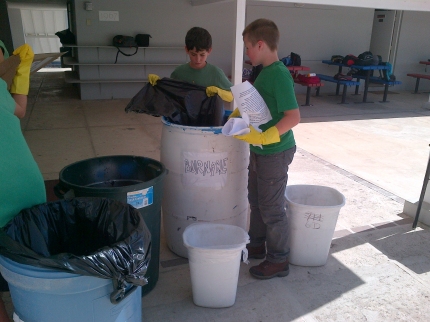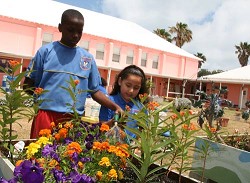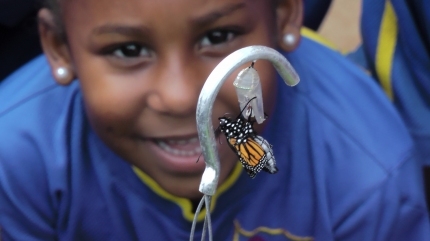"We do not inherit the earth from our ancestors; we borrow it from our children."
~ Navajo Proverb

Eco-Schools is an international award program that guides schools on their sustainable journey, providing a framework to help embed these principles into the heart of school life. Created by the Foundation for Environmental Education (FEE), the program is currently implemented in 55 countries, involving 46,000 schools. Eco-Schools is recognized by the United Nations as a model initiative for Education for Sustainable Development.
In October 2013, Greenrock was honoured to be recognized as the FEE representative in Bermuda, and offered the Eco-Schools program to local schools until June 2019. Our pre-existing Green Schools program formed the basis of - and was replaced by - the Eco-Schools program. The aim of Eco-Schools is to raise students’ awareness of sustainable development issues through classroom study and community action. Primary, Middle and Secondary schools are invited to participate. In June 2019 Greenrock transferred to the Eco-Schools Program to BUEI, who is currently recognized as the FEE representative in Bermuda. To date Greenrock remains in touch with BUEI regarding the program and provides advice and support as needed.
BERNEWS article on the transition
The Need
Bermuda's schools do not currently have a recognized, integrated environmental education program that promotes long-term, whole-school (students, teachers, parents, community) action for sustainability. According to the Center for Green Schools, a green school can improve student performance and health, while decreasing operational costs and energy demands, protecting the environment. In addition a holistic approach which combines learning and action:
- Helps students to feel a part of their immediate environment
- Provides an understanding of the costs of continuing in unsustainable ways
- Involves individuals in successful change, increasing their sense of self-efficacy
- Instills the desire to take on responsibility for the environment
- Provides the tools to make the appropriate changes
- Empowers individuals to take the necessary steps to protect the future.
Our Approach
Our approach started with the Greenrock School Roadshow introducing students to sustainable living concepts. This energy was then be harnessed to form an Eco-club or Green Team — if one did not exist. Greenrock assisted schools interested in forming an Eco-club or Green Team.
Greenrock continued to support the school Eco-Club or Green Team as they choose an environment theme or pathway and progress through the "Seven Steps to Sustainability":
- Eco-Schools Committee ("Green Team")
- Environmental Review
- Action Plan
- Monitor and Evaluate
- Curriculum Work
- Inform and Involve
- Produce an Eco-Code
Once the school has registered and implemented these Seven Steps it can apply for an Eco-Schools Award.
Eco-School Themes:
Core to the Eco-Schools model is that schools select one environmental theme at a time. This is to enable and facilitate a strong focus on one element and not feel overwhelmed at completely changing the school. As the eco club/green team quickly learns, there are many components to making simple changes in behaviour and infrastructure. Once they have gained the experience of a journey along one theme, they will be better equipped to tackle their next.
 Students separate school trash as part of Waste Audit and Monitoring.
Students separate school trash as part of Waste Audit and Monitoring.
Students separate school trash over one week into 4 different categories: paper, recyclables, compost, and waste. Students then learn about what happens to waste and brainstorm ways to reduce waste in school, sharing their ideas in school assemblies, or writing them up as reports. The audit is repeated the following term or year to measure any change. This module can also be combined with trash-free lunch initiatives and recycling initiatives.
Each school in Bermuda spends between $5,000 and $100,000 monthly on electricity. At Elliot Primary School, we identified simple changes in behaviour and equipment (e.g. LED lights, timers on heaters, motion sensors on lights) which are expected to reduce electricity bills by 15%. Suggested steps in this module include: bringing in a consultant to do an energy audit (in which the students would participate); school education on how to cut electricity; and potentially the installation of some low energy lighting, timers on lights and motion sensors. Students learn about electricity generation from both finite (fossil fuel) and renewable energy sources, and how electricity costs impact their lives. Students keen to explore renewable energy further are encouraged to build models to demonstrate and harness solar, wind and wave power.
 Green-fingered: Pupils Taiquan Davis, 11, and Kristy Sanchez, 6, are members of the gardening club at Elliot Primary School. *Photo by Sirkka Huish
Green-fingered: Pupils Taiquan Davis, 11, and Kristy Sanchez, 6, are members of the gardening club at Elliot Primary School. *Photo by Sirkka Huish
Relating to and earning credit towards Eco-Schools pathways Biodiversity or Healthy Living, school gardens hold tremendous educational and experiential value for a school community. They can also be time consuming and labour intensive to plant and maintain. Greenrock Healthy Harvest Director, Omari Dill, can help design the school garden, and advise on plant selection, soil conditioning and pest management. It is critical that the school appoint an enthusiastic School Garden Co-ordinator — ideally a staff member — to provide on-going leadership. Once established, the school garden is maintained by volunteers from the school community, under the stewardship of the School Garden Co-ordinator.
If addressing the pathway of biodiversity, students take an active role in promoting more plant and animal species on their school grounds. This can relate to a biology lesson or social studies as they learn the value of diversity.
If addressing the pathway of health living, they understand how they can move closer towards self-sustainability and community sharing by growing their own organic and local food which has a direct positive result on their own health and on the environment around them. Maintaining a successful school garden includes mathematics, science, biology, history, ecology, economics and social studies. Students involved develop communication skills, evolve collaborative relationships and cultivate management practices
If taking on a school garden is too big a project then the Eco-club could consider a composting project. This is a simple initiative to deal with food waste, and is a wonderful way to teach children about life cycles. It is particularly successful in primary school environments. The children can use the resulting compost to grow flowers or as part of an Ag Show entry.
More and more vehicles are clogging our small roads with the size of many of them seemingly unnecessary. However, even on a small island, the way we move around is an important part of our lives and we are becoming more reliant on it. Still, this daily routine has negative effects on the environment in terms of pollution, depletion of resources, and stress among our community. There are simple ways to reduce these problems - by taking public transportation, carpooling, or cycling, running, or walking where possible.
Students can explore how and where from their peers travel to school and various activities. They can then pursue alternative means and encourage the school to adopt a sustainable transport policy, such as sharing rides or walking together. This has a direct link to improved social relationships and physical well-being.
It is undeniable that water is essential to life and often we can take this for granted. In Bermuda it is engrained in our culture to conserve water based on our history with how we harvest it. This incredible resource is used for drinking, cleaning and part of a system that enables our crops to grow. It is also used in making products and is both dangerously wasted and dangerously scarce around the world. Humans have put such a high demand on fresh water that the natural system is threatened. In many areas, pollution runoff, sewage leaks, chemical discharged, and oil spills have put our source of life at risk.
Tackling this theme, students will explore how water permeates through many aspects of life, both directly in the water we see coming out of the taps and flushing down the toilets, and indirectly in the embedded water in the products we buy. They will understand just how much water is consumed by the school each day and how wastage of such a previous resource can be reduced. Students will enhance their understanding of the value of fresh drinkable water and consider the impacts of disposable packaged bottled water.
Additional Supported Activities:
Although not core Eco-School Themes, Greenrock helped to facilitate the following student activities;
 Environmental mapping teaches students to appreciate the eco-system of their school.
Environmental mapping teaches students to appreciate the eco-system of their school.
The goal of this module is to cultivate a sense of place, by teaching students to understand and appreciate their school's eco-system. The first step is environmental mapping* of the school campus to:
- Identify native flora and fauna
- Areas of environmental richness
- Areas of environmental degradation
Greenrock provided lesson plans that make use of the environmental mapping in the classrooms. This module brings the subjects of mathematics, history, biology, economics, ecology and social studies alive as students scrutinize their school eco-system with new lenses. Greenrock believed that this approach captures children's imaginations and helps advance environmental stewardship and civic engagement. *Note: This project is subject to funding for a landscape consultant to oversee the mapping.
Greenrock encouraged middle and high school students to participate in the annual Earth Day video competition. Teachers can adopt the video project as an integral part of the school curriculum, or it can be used to enrich a maths, science or social studies unit. We encourage students to think creatively about living sustainably, to take action and to make their voices heard.
There are many opportunities in the school calendar where students can brainstorm and implement ways to 'go green'; for example Sports Day, Green Grub days, special events such as fashion shows. Rethinking these events to be sustainable is a great way to build school spirit, as well as providing education on recycling, energy, consumer goods and waste.
Contact
For more information about the Eco-Schools program and themes, or about setting-up or joining an eco club or green team at your school, please contact the Bermuda Underwater Exploration Institute | BUEI Eco-Schools Coordinator, Hannah Lampit at 441.294.0207 or This email address is being protected from spambots. You need JavaScript enabled to view it.

